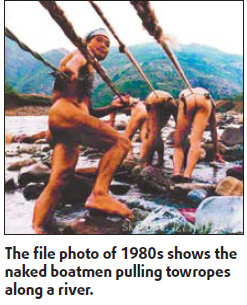The salt of Chishui River
By Raymond Zhou (China Daily)
Updated: 2009-12-09 09:30
 |
Large Medium Small |
Any restaurant in Guizhou, big or small, has a saltshaker on each table - just like in the rest of the country.
But a century ago, this was unthinkable. Salt was a precious commodity. It was not consumed in refined grains, but rather, in pebble-sized lumps. One would dip it into a dish and quickly withdraw, leaving a faint taste of brackishness.
The inland province of Guizhou does not produce any salt. Historical records show that even horses fell sick from a deficiency of salt. So, shipping salt to Guizhou was a big business, with much of the supplies coming from neighboring Sichuan. As Guizhou was landlocked, the Chishui River was a major route of transport.
Hauling this most basic of human essentials upstream - against the falling rapids and treacherous bends - were an army of boatmen known for their stark naked bodies, severely suntanned, and their vigorous and haunting chants.
"It's true the trackers who pulled the towropes did not wear any clothes," says Yuan Qiao, a local historian. "They had to constantly get into the water. It was not practical to wear anything."

By the 1980s, when this line of work was totally eliminated by steamboats, only a few photographers caught a glimpse of some who worked along China's mighty rivers. Some self-conscious ones posed with their clothes on. A few years ago, Yuan tried to recreate such a scene but he found to his chagrin that the young boatmen of this generation were so removed from the old lifestyle that they simply did not embody any of the authenticity he was looking for.
"Boatmen of the old generations were not just au naturel but totally natural about it. They would not evade women who happened to be doing the laundry at the riverside. Nor would the women turn away. Instead, they would add elements of love songs in their chants. It was the most beautiful sight, something we could not possibly recreate nowadays," says Yuan.
Life for the boatmen was hard. They had to be away from home a month at a time. They ate and slept on the boat. There were a lot of superstitions: Any word that sounded like "sink", "fall", or "drown" had to be avoided. Women were not allowed to walk over a rope. No dead body could be carried onboard. If someone got ill on boat, it was considered unlucky, so he had to hide it instead of seeking care on shore. If he died, he would be buried nearby and not be carried back home. It was believed that dead people would leave ghosts behind, who would haunt and bring disaster to the living.
A ritual at the launch of a new boat, or the start of a long voyage, was to sacrifice a pig or a rooster and splatter its blood on the bow, stern, keel and mast. That was to appease the gods of the river and the boats.
Rats were revered. If the boatmen saw rats jumping into the river, it was considered a bad omen. They would light candles, burn incense and offer food. After a few days, believing bad luck had been averted, they would continue the journey, gnawed by angst.
An important position, right after the helmsman, was that of the lead chanter. Chanting was not for diversion; it was a coordinated and instantaneous way of giving and receiving instructions, explains Yuan. The lead chanter had to know the terrain, especially the shoals - and there were 70 of them that could capsize boats.
Not until a boat reached a straight and peaceful section could the chants turn to frolicking, bantering and even amorous longing. "The Chishui chant is a variant of the better-known Sichuan boatmen's chant," notes Yuan.
"It has not been as well-preserved and recorded, though." But Yuan has been making amends. He has sought out many of the surviving boatmen, now all in their 80s or 90s, and chronicled every word and note. He also reproduces it vocally as he is a trained musician.
The most amazing story about Chishui boatmen concerns one special lead chanter named Hu, who was a woman. "She was so good her piercing pitch could raise the bow up the shoal, so every operator wanted to hire her. Just imagine a single woman, a widow, working among a bunch of naked men. She was one tough cookie, hurling the strongest language, even lashes, at the lazy ones. She is still held in awe, even remembered as a kind of goddess."
In a sense, boatmen of that age are like coalminers today. They were placed low on the social ladder, but were paid more than other jobs they could find. Echoes from the past, including photos and chants, have elevated them to a legendary status. Their sufferings have turned mythic. Their strenuousness, frozen poses of artistic beauty.